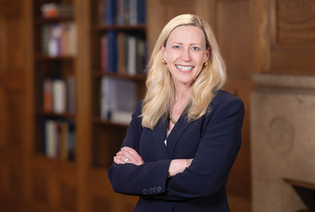
Dan Renzetti
The Yale Alumni Magazine publishes a letter from President Maurie McInnis ’96PhD in every issue. In this letter, the president discusses Yale’s efforts to combat climate change.
View full image
In my initial weeks as Yale’s president, I have been speaking with students, faculty, staff, and alumni, and touring research and teaching facilities, museums and libraries, and many other areas of campus. It is heartening to see the excitement for addressing complex challenges, and the innovation, problem solving, and new discoveries that flow from that work. During these early visits, I have learned about inspiring projects that bridge multiple disciplines and draw from the strengths of the entire community. This is exemplified by our urgent work to combat climate change and biodiversity loss.
In late September, I will participate in Yale @ Climate Week NYC, held at the Yale Club in Manhattan. This year, Yale will have its largest- ever presence at Climate Week, which takes place in partnership with the United Nations General Assembly. The university will convene thought leaders and innovators along with Yale faculty members, staff, students, and alumni.
I look forward to reflecting on Yale’s role in addressing climate issues, and what I envision for where we must go from here. I am proud that Yale has made its own climate commitments and is focused on generating innovative ideas that advance a more sustainable, healthy future. The urgency of the environmental crises facing humanity has continued to intensify, and the need for Yale to serve as a model and a source of knowledge and solutions has only grown.
Yale Planetary Solutions (YPS) is the north star for the university’s efforts—generating discoveries and translating them into action and impact with all that Yale is and all that Yale does. Announced in 2020, the initiative has worked to foster, amplify, and accelerate education, scholarship, and research across the university. Since then, we have established the Yale Center for Natural Carbon Capture and the Yale Center for Geospatial Solutions; provided seed grants to support projects led by faculty and staff across the Faculty of Arts and Sciences and nine professional schools; and steadily progressed toward our campus net-zero carbon emission goals, using Yale as a testing ground for effective strategies that can be shared with communities around the world.
YPS extends from Yale’s well-established research and action here in New Haven, to our contributions around the globe. In the sciences and engineering, faculty members have long been producing core scientific insights, innovations, and technologies, ranging from understanding the rapid evolution of keystone species to developing new methods for water purification. In the arts, humanities, and social sciences, our scholars have helped us understand complex human responses to climate change and pioneered data-driven models of urban growth, among many other contributions. Our alumni have made advancements through climate policy, advocacy, and more. These efforts individually, and those that transcend disciplinary boundaries, create pathways to innovative solutions that can be applied across scales and contexts.
Of course, progress also requires that we harness Yale’s educational mission. Yale’s focused work reflects the urgency of preparing the next generation to lead on environmental issues. In spring 2024, more than seventy courses offered on campus, ranging from art to engineering to law, integrated the topic of climate change.
Recently, the university created new academic programs, including the Three Cairns Climate Scholars from the Global South, the Bekenstein Climate Leaders Program, and the Emerging Climate Leaders Fellowship. Yale has seen an exciting expansion of online non-degree certificates that support planetary solutions on subjects ranging from clean energy finance to climate change and health.
Additionally, Yale Divinity School broke ground last fall on the Living Village Project, a regenerative and zero-waste residence hall that aims to give back to the earth more than it takes. We have also reduced our net emissions by twenty-eight percent since 2015 despite an eleven percent increase in campus size.
Credit for these initiatives belongs to leaders and innovators on our campus, alumni and supporters around the world, and my predecessors Peter Salovey ’86PhD and Rick Levin ’74PhD. It also belongs to Provost Scott Strobel and the faculty members and staff who charted Yale’s science strategy, leading to the university’s investment in planetary solutions as a key priority. These efforts formed a strong foundation on which we continue to build, including the appointment last fall of Professor Julie Zimmerman as the inaugural vice provost for planetary solutions.
Combating climate change, biodiversity loss, and other urgent challenges will require technological innovation, political will, human understanding, and collective international action. Yale must lead and draw on all our strengths. In concert with partners around the globe, I am confident we will introduce transformative planetary solutions for a better world.
 loading
loading
1 comment
-

WEI CHE "Alfred", 12:09pm September 21 2024 |  Flag as inappropriate
Flag as inappropriate
The comment period has expired.As an alumn and practitioner in climate and energy, it has been my pleasure and privilege watching YPS grow under strong and continued Yale presidential leadership. Apparently, the commitment confirmed by President McInnis sent a strong message for the further development of YPS. Ii is very exciting to see Yale will have the largest-ever presence at the upcoming Climate Week in NYC, offering the best from YPS and beyond to this signficant event. Best wishes for Yale's success at the event and beyond!
Alfred (IR '95)